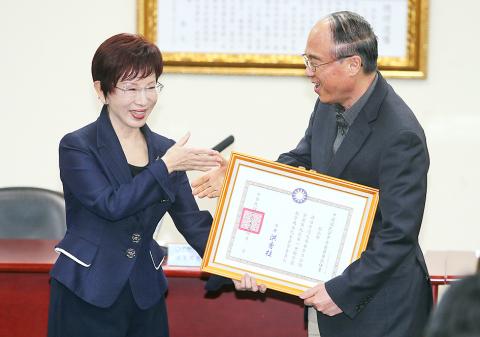Chinese Nationalist Party (KMT) Chairwoman Hung Hsiu-chu (洪秀柱) yesterday rebuffed the KMT caucus’ call for the caucus to elect its own general convener as caucus whip, saying that the person elected by the caucus “would be the deputy executive director of the party’s policy committee,” a position that would be under the leadership of the party-assigned policy committee’s chief executive director, who is conventionally the KMT caucus whip.
The KMT caucus proposed before the KMT chairperson by-election on March 26 to set up a new caucus position of “general convener” to double as the caucus whip, who is to be elected from among KMT lawmakers.
The move by the caucus has been seen as one that aims to hollow out the power of the party headquarters.

Photo: CNA
Hung said during the KMT Central Standing Committee meeting yesterday that she supports the establishment of a new position, but the elected convener would be “ex officio policy committee deputy executive director,” who would thereby be under the leadership of the KMT policy committee’s chief executive director, who doubles as the KMT caucus whip by convention.
“The legislature is composed of elected representatives who have the responsibility to oversee the government. The party’s think tank [the policy committee] would not only be the shadow Cabinet, but also an ammunition depot for the party lawmakers to do their job with better information,” Hung said. “The general convener elected by the caucus would be ex officio deputy executive director of the policy committee, which would bind the party, the think tank and the caucus closely together and maximize the party’s performance in the legislature.”
Hung said the Democratic Progressive Party now holds a majority in the legislature and the presidency, rendering the KMT as “utterly an opposition party.”
“We have only 35 seats left in the legislature and it would rely on their performance for the party to act as a loyal opposition party. The legislature would also be the place for the party to remake its image for the public to trust us,” Hung said.
In the Central Standing Committee meeting, the party-assigned caucus officials were officially endorsed.
KMT Legislator Lin Te-fu (林德福) remains as the caucus secretary-general, or conventionally the “small” caucus whip, as opposed to the “large” caucus whip, who is the chief executive director of the policy committee.
Jonny Chiang (江啟臣) is the first deputy secretary-general, with Alicia Wang (王育敏), Hsu Shu-hua (許淑華) and Lee Yan-hsiu (李彥秀) being appointed as deputy secretaries-general.

Taiwan has received more than US$70 million in royalties as of the end of last year from developing the F-16V jet as countries worldwide purchase or upgrade to this popular model, government and military officials said on Saturday. Taiwan funded the development of the F-16V jet and ended up the sole investor as other countries withdrew from the program. Now the F-16V is increasingly popular and countries must pay Taiwan a percentage in royalties when they purchase new F-16V aircraft or upgrade older F-16 models. The next five years are expected to be the peak for these royalties, with Taiwan potentially earning

STAY IN YOUR LANE: As the US and Israel attack Iran, the ministry has warned China not to overstep by including Taiwanese citizens in its evacuation orders The Ministry of Foreign Affairs (MOFA) yesterday rebuked a statement by China’s embassy in Israel that it would evacuate Taiwanese holders of Chinese travel documents from Israel amid the latter’s escalating conflict with Iran. Tensions have risen across the Middle East in the wake of US and Israeli airstrikes on Iran beginning Saturday. China subsequently issued an evacuation notice for its citizens. In a news release, the Chinese embassy in Israel said holders of “Taiwan compatriot permits (台胞證)” issued to Taiwanese nationals by Chinese authorities for travel to China — could register for evacuation to Egypt. In Taipei, the ministry yesterday said Taiwan

Taiwan is awaiting official notification from the US regarding the status of the Agreement on Reciprocal Trade (ART) after the US Supreme Court ruled US President Donald Trump's global tariffs unconstitutional. Speaking to reporters before a legislative hearing today, Premier Cho Jung-tai (卓榮泰) said that Taiwan's negotiation team remains focused on ensuring that the bilateral trade deal remains intact despite the legal challenge to Trump's tariff policy. "The US has pledged to notify its trade partners once the subsequent administrative and legal processes are finalized, and that certainly includes Taiwan," Cho said when asked about opposition parties’ doubts that the ART was

If China chose to invade Taiwan tomorrow, it would only have to sever three undersea fiber-optic cable clusters to cause a data blackout, Jason Hsu (許毓仁), a senior fellow at the Hudson Institute and former Chinese Nationalist Party (KMT) legislator, told a US security panel yesterday. In a Taiwan contingency, cable disruption would be one of the earliest preinvasion actions and the signal that escalation had begun, he said, adding that Taiwan’s current cable repair capabilities are insufficient. The US-China Economic and Security Review Commission (USCC) yesterday held a hearing on US-China Competition Under the Sea, with Hsu speaking on